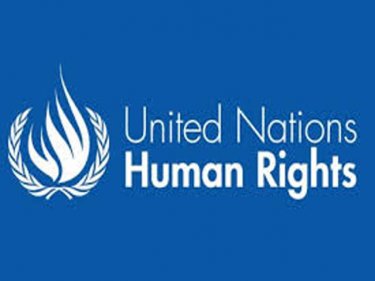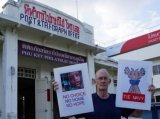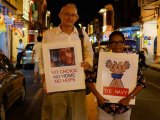A letter seeking a reply within 60 days was addressed to former Prime Minister Yingluck Shinawatra on April 30. New Prime Minister Prayuth Chan-ocha will now be expected to respond.
The letter has been published in Geneva in the past few days, in accordance with diplomatic protocols.
''We express grave concern at the allegations of the use of defamation laws, in particular the Computer Crimes Act, to restrict the right to freedom of opinion and expression of journalists in the Kingdom of Thailand,'' the letter says.
''We would like to stress our concerns regarding the use of the judicial proceedings, imposing criminal sanctions, on cases related to defamation.''
The Phuket journalists, Chutima Sidasathian and Alan Morison, were recently refused entry to the Royal Thai Navy base on Phuket, which is now also the island headquarters of the National Council for Peace and Order.
The journalists say that the posting of Khun Chutima's photograph in the entrance guardhouse as a blacklisted person is a sign that a vendetta is being carried out to prevent Phuketwan from reporting on the NCPO's activities.
The letter to Thailand's Government is signed by Frank La Rue, Special Rapporteur on the promotion and protection of the right to freedom of opinion and expression, and Margaret Sekaggya, Special Rapporteur on the situation of human rights defenders.
''We have always admired the Royal Thai Navy and we were surprised and shocked at this unprecedented military versus media action,'' Morison said today.
''It's sad that Thailand's reputation continues to be tarnished when a simple phone call by the Navy back in July last year to Reuters news agency or Phuketwan would have resolved this matter immediately.''
The trial of the two journalists in Phuket Provincial Court has now been postponed until July next year. Morison and Khun Chutima face a maximum penalty of seven years in jail if they are found guilty of criminal defamation and breaches of Thailand's controversial Computer Crimes Act.
Morison's passport has been seized. The Phuketwan news site may have to close in February when it will be almost impossible for him to renew his annual work permit.
The case is over a 41-word paragraph from a Pulitzer prize-winning Reuters report on the Rohingya boatpeople. Reuters and other news organisations in Thailand that published the same paragraph have not been charged.
UNITED NATIONS
OFFICE OF THE UNITED NATIONS
HIGH COMMISSIONER FOR HUMAN RIGHTS
SPECIAL PROCEDURES OF THE
HUMAN RIGHTS COUNCIL
Mandates of the Special Rapporteur on the promotion and protection of the right to freedom of opinion and expression and the Special Rapporteur on the situation of human rights defenders
April 30
Excellency,
We have the honour to address you in our capacities as Special Rapporteur on the promotion and protection of the right to freedom of opinion and expression and Special Rapporteur on the situation of human rights defenders pursuant to Human Rights Council resolutions 25/2 and 25/18.
In this connection, we would like to draw the attention of your Government to information we have received regarding the charges against Mr. Alan Morison and Ms.Chutima Sidasathian, journalists based in Phuket, Thailand.
Mr. Alan Morison is the editor of Phuketwan, a news outlet based on Phuket, Thailand. Ms. Chutima Sidasathian is a journalist working for Phuketwan.
According to the information received:
Mr. Morison and Ms Sidasathian have been closely monitoring and reporting on the situation of the Rohingya people travelling to the coast of Thailand by boat.
They initially learnt about the situation of the Rohingya people during an interview in 2008 with the Royal Thai Navy that later supplied them with photographs of Rohingya people being apprehended. Since then, they have been investigating the situation, reporting on the Thai military's alleged involvement in pushbacks of the Rohingya people to the sea.
On 18 December 2013, a captain acting on behalf of the Royal Thai Navy filed criminal defamation charges against Mr. Morison and Ms. Sidasathian for damaging the Navy's reputation and for breaching the Computer Crimes Act.
The charges are based on a paragraph taken from a report published by Reuters on 17 July 2013.
1. A part of the report was published by online media, including Phuketwan on the same day. The paragraph replicated by Phuketwan implicates the Royal Thai Navy in profiting from systematic smuggling.
2. On the same day, [ 18 December] Mr. Morison and Ms. Sidasathian reported to the Phuket police to hear the charges brought against them.
On 17 April 2014, Mr. Morison and Ms. Sidasathian were formally charged with defamation and violation of Section 14 the Computer Crimes Act. Reportedly, they could face up to seven years of imprisonment and/or fines amounting to 100,000 baht (about 3,000 USD). They paid the bail and were released from custody after being held for five hours in detention.
Mr. Morison and Ms. Sidasathian are reportedly due to appear in Court for another preliminary hearing on 26 May 2014. The trial is expected to be scheduled within the next few months. [It resumes in July, 2015.]
We express grave concern at the allegations of the use of defamation laws, in particular the Computer Crimes Act, to restrict the right to freedom of opinion and expression of journalists in the Kingdom of Thailand. We would like to stress our concerns regarding the use of the judicial proceedings, imposing criminal sanctions, on cases related to defamation.
We are also concerned with the use of civil or administrative sanctions, for defamation and/or in application of the Computer Crimes Act should which can exert a chilling effect on freedom of expression and opinion.
While we do not wish to prejudge the accuracy of these allegations, we would like to recall that freedom of opinion and freedom of expression are essential for any society and constitute the foundation stone for every free and democratic society. In particular, we would like to refer to your Excellency's Government to article 19 of the International Covenant on Civil and Political Rights (ICCPR), to which Thailand is a party, which provides that ''Everyone shall have the right to freedom of expression; this right shall include freedom to seek, receive and impart information and ideas of all kinds, regardless of frontiers, either orally, in writing or in print, in the form of art, or through any other media of his choice.''
In particular, we would like to draw your Excellency's Government's attention to the principle of proportionality of the sentences and penalties imposed in the application of legislation which provides restriction to the right to freedom of expression, including on defamation. Paragraph 3 of Article 19 of the ICCPR lays down specific conditions and it is only subject to these conditions that restrictions may be imposed: the restrictions must be ''provided by law''; they may only be imposed for one of the grounds set out in subparagraphs (a) and (b) of paragraph 3; and they must conform to the strict tests of necessity and proportionality.
Restrictions are not allowed on grounds not specified in paragraph 3, even if such grounds would justify restrictions to other rights protected in the Covenant. Restrictions must be applied only for those purposes for which they were prescribed and must be directly related to the specific need on which they are predicated.
Moreover, we would like to refer to the General Comment no.34 of the Human Rights Committee (CCPR/C/GC/34), which emphasizes that States parties should ensure that legislative and administrative frameworks for the regulation of the media are consistent with the provisions of paragraph 3 of the CCPR and that the legislation, including defamation laws must be crafted with care to ensure that they comply with paragraph 3 of the ICCPR, and that they do not serve, in practice, to stifle freedom of expression.
We would like to stress that criminal sanctions, in particular imprisonment, for libel and defamation are not deemed proportional with an effective exercise of the right to freedom of opinion and expression. In particular, we would like to refer again to the General Comment no.34 of the Human Rights Committee (CCPR/C/GC/34), which emphasizes that ''the mere fact that forms of expression are considered to be insulting to a public figure is not sufficient to justify the imposition of penalties, albeit public figures may also benefit from the provisions of the Covenant.
''Moreover, all public figures, including those exercising the highest political authority such as heads of state and government, are legitimately subject to criticism and political opposition. Accordingly, the Committee expresses concern regarding laws on such matters as, lese majeste, desacato, disrespect for authority, disrespect for flags and symbols, defamation of the head of state and the protection of the honour of public officials, and laws should not provide for more severe penalties solely on the basis of the identity of the person that may have been impugned. States parties should not prohibit criticism of institutions, such as the army or the administration.'' (para.38)
The Human Rights Committee added that ''In any event, a public interest in the subject matter of the criticism should be recognized as a defence. Care should be taken by States parties to avoid excessively punitive measures and penalties. ( . . . ) States parties should consider the decriminalization of defamation and, in any case, the application of the criminal law should only be countenanced in the most serious of cases and imprisonment is never an appropriate penalty.'' (para. 47)
We also take the opportunity to reiterate the recommendations made in the reports of the Special Rapporteur on the promotion and protection of the right to freedom of opinion and expression (E/CN.4/2000/63, para.52 and E/CN.4/2001/64, para.48), which urged all States to review their defamation laws in order to ensure that they do not restrict the right to freedom of expression and to bring them in line with their international human rights obligations, which inter alia stressed that civil sanctions for defamation should not be so large as to exert a chilling effect on freedom of expression and should be designed to restore the reputation harmed, not to compensate the plaintiff or to punish the defendant; in particular, pecuniary awards should be strictly proportionate to the actual harm caused and the law should prioritize the use of a range of non-pecuniary remedies.
In this connection, we would like to refer your Excellency's Government to the fundamental principles set forth in the Declaration on the Right and Responsibility of Individuals, Groups and Organs of Society to Promote and Protect Universally 4 Recognized Human Rights and Fundamental Freedoms, and in particular articles 1 and 2 which state that ''everyone has the right individually or in association with others, to promote and to strive for the protection and realization of human rights and fundamental freedoms at the national and international levels'' and that ''each State has a prime responsibility and duty to protect, promote and implement all human rights and fundamental freedoms, inter alia, by adopting such steps as may be necessary to create all conditions necessary in the social, economic, political and other fields, as well as the legal guarantees required to ensure that all persons under its jurisdiction, individually and in association with others, are able to enjoy all those rights and freedoms in practice''.
Furthermore, we would like to bring to the attention of your Excellency's Government the following provisions of the Declaration:
- article 6 point a) which provides that everyone has the right, individually and in association with others to know, seek, obtain, receive and hold information about all human rights and fundamental freedoms, including having access to information as to how those rights and freedoms are given effect in domestic legislative, judicial or administrative systems.
- article 6 points b) and c) which provide that everyone has the right, individually and in association with others as provided for in human rights and other applicable international instruments, freely to publish, impart or disseminate to others views, information and knowledge on all human rights and fundamental freedoms; and to study, discuss, form and hold opinions on the observance, both in law and in practice, of all human rights and fundamental freedoms and, through these and other appropriate means, to draw public attention to those matters.
Moreover, it is our responsibility under the mandates provided to us by the Human Rights Council, to seek to clarify all cases brought to our attention. Since we are expected to report on these cases to the Human Rights Council, we would be grateful for your cooperation and your observations on the following matters:
1. Are the facts alleged in the summary of the case accurate?
2. Please provide information on the charges and criminal proceedings against Mr. Morison and Ms. Sidasathian for the publication of information in performance of their work as journalists.
3. Please provide information on measures taken or to be taken, in order to ensure that criminal sanctions are not imposed on cases related to defamation and that civil or administrative sanctions do not exert a chilling effect on freedom of expression and opinion, and that any limitation imposed on the right to freedom of expression and opinion are consistent with the provisions of paragraph 3 of the ICCPR.5
4. Please provide information on measures taken or to be taken, in order to repeal criminal defamation laws in Thailand and to put the legislation in conformity with Thailand's obligations under international human rights instruments, namely the International Covenant on Civil and Political Rights.
We would appreciate a response within sixty days. Your Excellency's Government's response will be made available in a report to the Human Rights Council for its consideration.
While waiting for your response, we urge your Excellency's Government to take all necessary measures to guarantee that the rights and freedoms of the above mentioned persons are respected and, in the event that your investigations support or suggest the above allegations to be correct, the accountability of any person responsible of the alleged violations should be ensured. We also request that your Excellency's Government adopt effective measures to prevent the recurrence of these acts.
Please accept, Excellency, the assurances of our highest consideration.
Frank La Rue
Special Rapporteur on the promotion and protection of the right to
freedom of opinion and expression
Margaret Sekaggya
Special Rapporteur on the situation of human rights defenders













That addresses issues well beyond just your case. It will be interesting if and how any response deals with the current restrictions imposed and enforced by this military govt.
Posted by Manowar on October 1, 2014 17:27